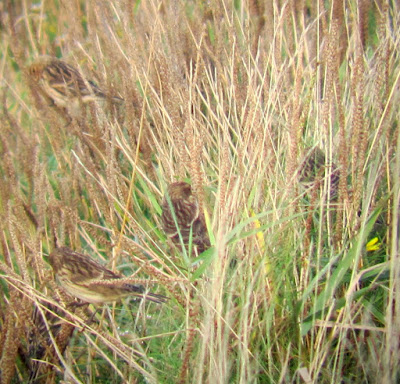I managed to get to Cockersands for the high tide on Friday, had a few rewards, and at least a little more life there than of late.
Twite.
Best was 12 Twite, one of which was a ringed bird. I would probably have lingered with these birds anyway to get the full enjoyment of finding them, but try reading rings on these finches is usually hampered by long vegetation to get to grips with colours and worse still any numbers they may have. However, I persisted for 20 minutes and finally got the reading, a Heysham bird appropriately reported.
Twite.
The photographs are a clear indication of the difficulties of ring reading on Twite.
Two Wheatear appear to be reluctant to move on from Cockersands, and were on the abbey ruins along with 2 Linnet. On the shingle at the caravan park end, 2 Rock Pipit seen, also 25 Greenfinch was a decent count. Skylark were in the air over a stubble field, probably many a dozen in it too, and the recent Buzzard seen 12 and 16 October was again surveying the terrain from a fence post. Off Crook Farm, 9 Black-tailed Godwit, and 25 Curlew were with at least 250 Lapwing.
Looking To Cockersands Lighthouse.
Out to sea, the area was looking its best as I left at dusk....All today's 'clik the pik' are your's truly.
Thanks to Dan Haywood for the header of the brilliant Yellow-browed Warbler he found locally on Thursday by Snuff Mill, Stodday.
Thanks to Dan Haywood for the header of the brilliant Yellow-browed Warbler he found locally on Thursday by Snuff Mill, Stodday.



Despite their drabness, I've always had a soft spot for Twite. They used to be a regular winter visitor here on the North Kent coast but over the last ten years have been rarely seen.
ReplyDeleteThat's a great picture of the setting sun. I got to see my first ever Twite about a month ago at Leasowe on the Wirral, bit only one, not 12 like you.
ReplyDeleteDerek....Thanks for this. Interesting to hear the Twite which was a regular winter visitor on the North Kent coast, has become a rarely seen bird. It is a species on the Red List (breeding decline).
ReplyDeleteFindlay....Winter visiting Twite in our area are mainly Western Scottish breeders.
At Leasowe they are as likely if not more likely to be of North(-west) Wales origin
ReplyDelete